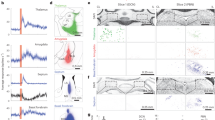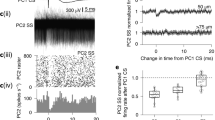Abstract
THAT strychnine has a stimulating action on the cerebellar cortex was shown by me a few years ago—(Science, 51, 413, 1920). On the application of strychnine to the surface of the lobulus ansiformis or cerebellar hemisphere the motor manifestations consist in increased tonus, together with clonus, affecting particularly the ipsilateral hindleg, though affecting also, to some extent, the forelegs and the contralateral hindleg. My positive results obtained with strychnine in the cat agree with those of Shimazono (Arch. f. mik. Anat., 80, 397, 1912), who observed an ipsilateral increase of tonus after applying strychnine to the cerebellar cortex in the pigeon.
This is a preview of subscription content, access via your institution
Access options
Subscribe to this journal
Receive 51 print issues and online access
$199.00 per year
only $3.90 per issue
Buy this article
- Purchase on Springer Link
- Instant access to full article PDF
Prices may be subject to local taxes which are calculated during checkout
Similar content being viewed by others
Author information
Authors and Affiliations
Rights and permissions
About this article
Cite this article
MILLER, F. The Action of Strychnine on the Cerebellar Cortex. Nature 117, 486–487 (1926). https://doi.org/10.1038/117486b0
Issue Date:
DOI: https://doi.org/10.1038/117486b0
Comments
By submitting a comment you agree to abide by our Terms and Community Guidelines. If you find something abusive or that does not comply with our terms or guidelines please flag it as inappropriate.



